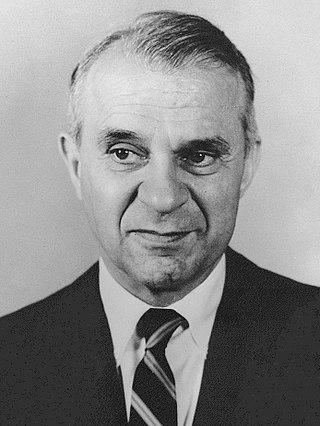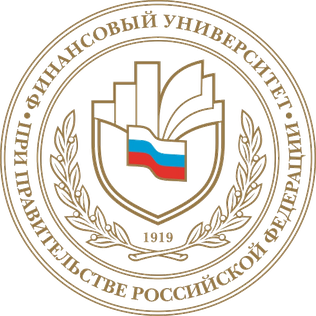Related Research Articles
Strategy is a general plan to achieve one or more long-term or overall goals under conditions of uncertainty. In the sense of the "art of the general", which included several subsets of skills including military tactics, siegecraft, logistics etc., the term came into use in the 6th century C.E. in Eastern Roman terminology, and was translated into Western vernacular languages only in the 18th century. From then until the 20th century, the word "strategy" came to denote "a comprehensive way to try to pursue political ends, including the threat or actual use of force, in a dialectic of wills" in a military conflict, in which both adversaries interact.

Wassily Wassilyevich Leontief, was a Soviet-American economist known for his research on input–output analysis and how changes in one economic sector may affect other sectors.

The Center for Strategic and International Studies (CSIS) is an American think tank based in Washington, D.C. From its founding in 1962 until 1987, it was an affiliate of Georgetown University, initially named the Center for Strategic and International Studies of Georgetown University. The center conducts policy studies and strategic analyses of political, economic and security issues throughout the world, with a focus on issues concerning international relations, trade, technology, finance, energy and geostrategy.
A strategist is a person with responsibility for the formulation and implementation of a strategy. Strategy generally involves setting goals, determining actions to achieve the goals, and mobilizing resources to execute the actions. A strategy describes how the ends (goals) will be achieved by the means (resources). The senior leadership of an organization is generally tasked with determining strategy. Strategy can be intended or can emerge as a pattern of activity as the organization adapts to its environment or competes. It involves activities such as strategic planning and strategic thinking.

The Patrice Lumumba Peoples' Friendship University of Russia, also known as RUDN University and until 1992 and after March 2023, as Patrice Lumumba University in honour of the Congolese politician Patrice Lumumba, is a public research university located in Moscow, Russia. It was established in 1960 by a resolution from the Central Committee of the CPSU and the Council of Ministers of the USSR to help nations to assist countries that had recently achieved independence from colonial powers. The university also acted to further Soviet foreign policy goals in nonaligned countries.
An emerging market is a market that has some characteristics of a developed market, but does not fully meet its standards. This includes markets that may become developed markets in the future or were in the past. The term "frontier market" is used for developing countries with smaller, riskier, or more illiquid capital markets than "emerging". As of 2006, the economies of China and India are considered to be the largest emerging markets. According to The Economist, many people find the term outdated, but no new term has gained traction. Emerging market hedge fund capital reached a record new level in the first quarter of 2011 of $121 billion. Emerging market economies’ share of global PPP-adjusted GDP has risen from 27 percent in 1960 to around 53 percent by 2013. The ten largest emerging economies by nominal GDP are 4 of the 9 BRICS countries along with Mexico, South Korea, Indonesia, Turkey, Saudi Arabia, and Poland. The inclusion of South Korea, Poland, and sometimes Taiwan are questionable given they are no longer considered emerging markets by the IMF and World Bank If we ignore those three, the top ten would include Argentina and Thailand.

Vladimir Sergeyevich Lisin is a Russian billionaire businessman. He is the chairman and majority shareholder of Novolipetsk (NLMK), one of the four largest steel companies in Russia.

Moscow State Institute of International Relations (MGIMO) is an institute of higher education located in Moscow, Russia. The institute is run by the Russian Ministry of Foreign Affairs.

Alexei Leonidovich Kudrin is a Russian liberal politician and economist. Previously he served as the Chairman of the Accounts Chamber from 2018 to 2022 and as Minister of Finance from 2000 to 2011. Since December 9, 2022 Corporate Development Advisor at Yandex.

Abel Gezevich Aganbegyan is a leading Soviet and Russian economist of Armenian descent, a full member of the Russian Academy of Sciences and an honorary doctor of business administration of Kingston University, the founder and first editor of the journal EKO.

Aron Iosifovich Katsenelinboigen was a founder of predispositioning theory, a subject in decision theory and systems theory that models development in the context of uncertainty.
Stanislav Gustavovich Strumilin (Strumillo-Petrashkevich) was a Soviet economist and statistician. He played a leading role in the analysis of the planned economy of the Soviet type, including modeling, development of the five year plans and calculation of national income. His particular contributions include the "Strumilin index", a measure of labor productivity, and the "norm coefficient", relating to analysis of investment activity.

David John Teece is a New Zealand-born US-based organizational economist and the Professor in Global Business and director of the Tusher Center for the Management of Intellectual Capital at the Walter A. Haas School of Business at the University of California, Berkeley.

Lev Markovich Gatovsky was a Soviet economist, being one of the first who tried to create a theoretical framework in which to understand the nature of the socialist project taking place in the Soviet Union from a political economy perspective. He became director of the Institute of Economics of the Soviet Academy of Sciences, later renamed Russian Academy of Sciencies, from 1965 to 1971. Apart from his general academic work, he contributed to several major economic developments such as the first two five-year economic plans and the 1965 Soviet Economic Reform, as well as editing the first Political Economy textbook of the USSR.
Marshall Irwin Goldman was an American economist and writer. He was an expert on the economy of the former Soviet Union. Goldman was a professor of economics at Wellesley College and associate director of the Harvard Russian Research Center. Goldman received his Ph.D. in Russian studies from Harvard University in 1961. Goldman was well known for his study of the career of Mikhail Gorbachev. His books on the former Soviet Union include The USSR in Crisis: The Failure of an Economic System, Lost Opportunity: What Has Made Economic Reform in Russia So Difficult, and Petrostate.

The Gubkin Russian State University of Oil and Gas is a public university in Moscow, Russia. The university was founded in 1930 and is named after the geologist Ivan Gubkin. The university is colloquially known as Kerosinka, meaning 'kerosene stove'.

Financial University under the Government of the Russian Federation is a public university located in Moscow, Russia. It was considered among top five universities in Russia in 2010 according to Forbes and RBC as well as one of the oldest Russian universities preparing economists, financiers, philosophers, bankers and financial lawyers.

Ural Federal University, named after the first President of Russia, Boris Yeltsin, is an educational institution in the Ural region of Russia. The Ural Federal University was formed by a merger of the Ural State Technical University and Ural State University. It is one of 10 Russian Federal Universities. The university cooperates with the Russian Academy of Sciences and serves as a research and innovation center for the Ural region. UrFU offers educational programs in four areas of knowledge and 108 academic majors.
Vladislav Leonidovich Malkevich was a Soviet and Russian economist.

Alexander Nikolayevich Shokhin is a Russian state, political and public figure and a Member of the Bureau of the Supreme Council of the party United Russia. Minister of Labour of the RSFSR. On 20 January 1994 to 6 November 1994, Minister of the Russian economy, 23 March 1994 to 6 November 1994, Deputy Chairman of the Russian Government.
References
- ↑ Libris Russian
- ↑ The Russian Academy of Sciences, 2006 update
- ↑ [Capitalizing on the New Russia, Arcade Publishing: New York, 1993 p. 29-33]
- ↑ [March 7, 1990 Komsomolskaya Pravda (Moscow)]
- ↑ Russika.Ru
- ↑ "УКАЗ Президента РФ от 10.05.2011 N 614 "О НАГРАЖДЕНИИ ГОСУДАРСТВЕННЫМИ НАГРАДАМИ РОССИЙСКОЙ ФЕДЕРАЦИИ"". Archived from the original on 2015-02-08. Retrieved 2015-08-09.
- ↑ [Kvint, Vladimir, The Global Emerging Market in Transition. Fordham University Press, 2006.
- ↑ Kvint Vladimir, The Global Emerging Market: Strategic Management and Economics. Routledge, New York, London, 2009].
- ↑ [Kvint Vladimir, Strategy for the Global Market. Routledge, New York, London, 2015].
- ↑ Arndt, Michael, November 03, 1991, Soviet Government won't cultivate Private Farms Chicago Tribune
- ↑ "The Global Emerging Market in Transition". Fordham University Press. Archived from the original on 4 March 2012.
- ↑ https://web-docs.stern.nyu.edu/old_web/aboutstern/publications/mba_bulletin2000.pdf.
{{cite web}}: Missing or empty|title=(help) - ↑ American University.
- ↑ School of Business: Adjunct Faculty La Salle University
- ↑ Graduate Catalog, La Salle University
- ↑ SEC Info.
- ↑ "Председателем совета директоров ЗАО "Морской вокзал" избран Владимир Квинт" [Vladimir Kvint was elected Chairman of the Board of Directors of Morskoy Vokzal CJSC]. portnews.ru (in Russian). 16 January 2007. Retrieved 13 May 2019.
- ↑ Wexner Foundation
- ↑ University of Bridgeport.
- ↑ Fulbright Scholar.
- ↑ Kremlin
- ↑ The International N. D. Kondratieff Foundation